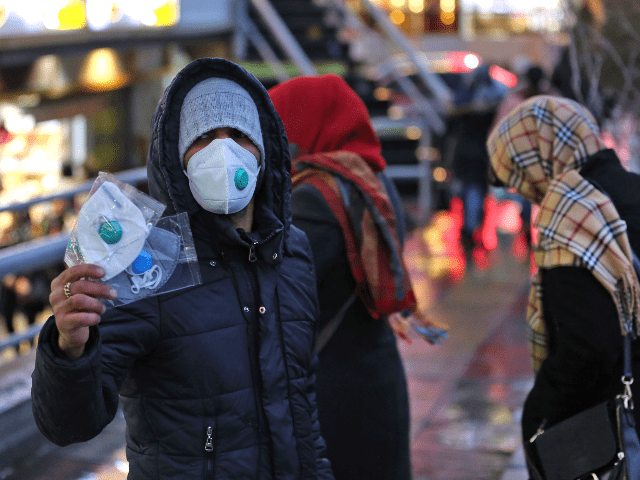China Touts ‘Health Silk Road’ Takeover Plan in Coronavirus-Stricken Iran

China’s ambassador to Iran published an op-ed on Monday promoting China’s “Health Silk Road,” – a new health care analog to China’s Belt and Road Initiative (BRI) – in the state-run Iran newspaper, Radio Farda, the Persian affiliate of Radio Free Europe/Radio Liberty (RFE/RL), revealed.
Iran has become the second-worst hit country after China by the Wuhan coronavirus, according to figures organized by dissident groups amid widespread distrust of official government statistics. Over 28,200 people have died from the coronavirus in Iran, according to the National Council of Resistance of Iran (NCRI), the country’s largest opposition group.
In contrast, Iran claims only 4,777 deaths officially. Local Iranian officials have cast doubt on this figure, however, noting that Tehran’s national numbers are smaller than the result of adding up local case counts in the nation’s various provinces.
The Health Silk Road “serves as a new approach for perfecting global public health governance,” according to an article published on March 25 by the People’s Daily, an official Chinese Communist Party (CCP) newspaper. “The joint construction of a Health Silk Road has expanded the space for cooperation on co-construction of the Belt and Road Initiative (BRI).”
China’s longer-established BRI has been a means for the country to establish and consolidate power across Asia, Europe, and Africa through infrastructure projects, which are economically predatory and debt-inducing for the host nation. Iran is already a key partner in China’s BRI.
Recently, however, Iran has joined the majority of the rest of the world in criticizing China for covering up the severity of its initial coronavirus outbreak in Wuhan, China, where the coronavirus originated late last year. By downplaying the initial outbreak, China cost the rest of the world valuable time to prepare for the virus’s spread, multiple studies have concluded. Iran has come to understand the damage caused by such deceit, perhaps more than any other country.
Iran was one of the first nations outside of China to experience a major coronavirus outbreak, a result of Tehran’s extremely close ties to Beijing through the BRI. According to Radio Farda, Iran’s coronavirus outbreak likely came “directly via Chinese Muslim seminary students in Qom in February or possibly earlier.”
Chang Hua published his “Health Silk Road” op-ed on Monday shortly after recent tension between him and Iran’s health ministry spokesman, Kianush Jahanpur.
“It seems statistics from China was a bitter joke because many in the world thought this is just like influenza, with fewer deaths. This [impression] were based on reports from China and now it seems China made a bitter joke with the rest of the world. If in China they say an epidemic was controlled in two months, one should really think about it,” Jahanpur said on April 5.
In response, Chang told Jahanpur he should follow daily press conferences “carefully in order to draw conclusions,” in a Twitter statement. Chang also recommended Jahanpur “show respect to the truths and great efforts of the people of China.”
Jahanpur replied to Chang on Twitter, noting the Iranian Health Ministry also held daily press conferences which “will be useful for honorable ambassadors and the media in all countries particularly in friendly countries.”
Afterward, Jahanpur tweeted:
Scientific issues can’t and should not be mixed with politics. On the basis of epidemiological information of Chinese researchers, 11 academic bodies in the world thought that at least Type A influenza was worse than coronavirus. Today’s findings show the opposite.
Jahanpur has openly criticized Iran’s own coronavirus management, casting doubt on the country’s officially reported virus numbers. On March 19, the health ministry spokesman admitted Iran was documenting a new coronavirus death every ten minutes. On March 23, Jahanpur objected to a public funeral for Iranian terrorist leader Hossein Assadollahi that resulted in thousands crowding urban streets.
Officially, Iran had only reported 4,683 deaths at press time on Tuesday, along with 74, 877 infections. However, many health authorities doubt Iran’s official coronavirus numbers, including members of its own government, most notably Jahanpur.
Photo: ATTA KENARE/AFP via Getty Images











